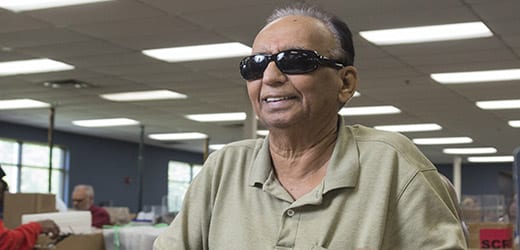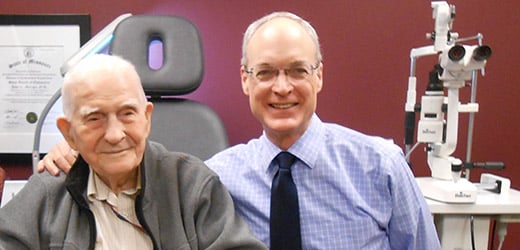A Blind Theatre Stage Manager? Alphapointe Team Member Defies Misconceptions

Dr. Jerome Kagan, one of the most influential psychologists in recorded history, established the concept that reaching a concrete conclusion is one of the most essential behavioral activities for humans because it affects virtually every element of a person’s psyche.
Rebekah Grieb knows exactly what Dr. Kagan was talking about because she’s lived without a concrete conclusion for the majority of her life.
Grieb has something. But, she can’t tell you what that “something” is. Neither can scores of specialists who have examined her.
What she can tell you is that “something” is an unidentified disease that causes blindness. But, that’s about it.
“It’s a degenerative disease without a diagnosis,” she said. “They think it’s genetic, but they’ve never been able to isolate the gene mutation. It’s been very frustrating because not only did I not know what was happening, but I also don’t know how it will manifest over time and how to deal with it when that happens.”
If that’s not the polar opposite of a concrete conclusion, nothing is.
That Grieb was diagnosed at all occurred by happenstance. At the age of 12, she had begun experiencing some significant challenges with her vision. When she scheduled an appointment with her regular eye doctor, she was seen by another doctor who identified previously overlooked issues.
Almost immediately, Grieb was dealt an enormous hardship – she would no longer be able to play softball, one of her most favorite activities. But, as they say, “the show must go on.”
And, it did.
Despite the incredible burden of not knowing when or how she’ll be affected by the mysterious disease, there is one absolute conclusion Grieb has reached: she won’t let it stop her from pursuing her passions.
As a freshman in high school, Grieb’s friends suggested she audition for a school play. Not only did she try out, but Grieb was tabbed as “Marilla” in “Anne of Green Gables” – one of the largest parts in the production.
“Theatre really saved my social life as a kid,” she said. “The theatre has really helped make the vision loss easier for me.”
After appearing in loads of plays in high school, Grieb attended college at Pittsburg State University where she earned a BA in communication with an emphasis in theatre with minors in both Spanish and international studies in 2007. For the most part, her vision held through college until it deteriorated to the point where she gave up driving in 2009.
After accepting a new job, Grieb relocated to Seattle where the abundance of transportation and minimal sunlight made things easier. Unfortunately, there was a re-organization within her workplace and her position in Seattle was eliminated. Grieb returned to the Kansas City area and resumed working for the same employer she had prior to moving to Seattle and remained for five years.
At that point, her vision had worsened and she realized that she needed help. But, Grieb encountered the all-too-frequent “catch-22” of having a disability and a full-time job at the same time.
“I didn’t want to live off the government, but the structure of providing assistance was frustrating,” Grieb said. “The assistance is meant to be supplemental, but when I had a job, I made too much money for the government to cover the services, which were only available from 9 a.m. to 5 p.m. That doesn’t work if you have a job. I was unemployed for about three years and that’s when these services actually became an option.”
Enter Alphapointe. Grieb participated in the Comprehensive Rehabilitation Program, where she received extensive training in adaptive technology, orientation and mobility and in braille. After two short months, Grieb was ready to re-enter the workforce. But, she wasn’t quite sure what she wanted to do.
Luckily, fate stepped in. Alphapointe had an opening in its Contract Management Services department, which oversees the close-out of federal contracts. However, positions in the department require government clearance, which can take a significant amount of time to process. Once again, fate entered the picture as Grieb worked on Alphapointe’s Contact Center team for nearly a year until her clearance came through.
She’s been meticulously examining contracts ever since.
“For the most part, what we do is review government contracts,” she said. “Anything that is purchased or a service that is paid for must have a contract so that all money is accounted for. By the time we receive a contract, our job is to make sure that the dates and dollars match. Has the work been completed? Has the contractor been paid? If so, we close out the contract.”
“Some departments are really good at keeping up to date with close-outs,” Grieb said. “But, I’ve also worked with contracts that are older than I am and just haven’t been closed out yet. Thankfully, that doesn’t happen too often.”
Grieb’s position at Alphapointe has also provided the opportunity to devote her spare time to the theatre. And, not just a little of her down time – a whole lot.
Grieb estimates that she’s participated in about 75 different productions since her turn in “Anne of Green Gables” with the bulk of her involvement in the past 15 years being behind the stage instead of on it as she frequently serves as a stage manager – a role that conventional wisdom suggests would not be possible for someone with vision loss.

During her first production as a stage manager with a particular theatre, she encountered a significant amount of skepticism – so much so that a “co-stage manager” was appointed for the comfort level of the crew. As it turns out, it wasn’t necessary then and it’s still not necessary now. She aced that production and has been welcomed back ever since.
“What I found in theatre was a community and group of people who said, ‘Yeah, you can’t do certain things, but that’s okay,’” Grieb said. “’You do all these other things a lot better than we can, so we want you to focus on that.’”
In the absence of a concrete conclusion for her vision, that adaptability has allowed Grieb to succeed both in her work and in her passions outside the office.
“I’m an example of how people can help you figure out how to adapt and do the things you love doing,” she said. “It doesn’t mean you can’t do those things anymore – it just means you need to find different ways to do them. If you think about it, even in the sighted world, everyone does things differently. For the visually impaired, it’s just taking that a step further. It’s just a matter of figuring out how things can work for you so that you get the same results as everyone else”
Grieb was recently promoted to the position of Contract Management Services Site Supervisor and she manages a group of several team members. Through this role at Alphapointe, she’s able to provide guidance and assistance to people who are now in a position she encountered earlier in her career. And, she’ll be able to help dispel the notion that people with low vision can’t do many of the things the sighted community assumes they can’t do.
“I know many people who are blind who have had similar experiences to me – you have a phone interview that went really well and then they see you walk in with a cane and they decide you can’t do the job,” Grieb said.
“I’m so glad to be in a position where I can give other visually impaired people a good paying job that they can be good at and also a job that can give them skills to move onward and upward. I wouldn’t be where I am if people hadn’t done that for me.”
Sounds like a pretty concrete conclusion.





